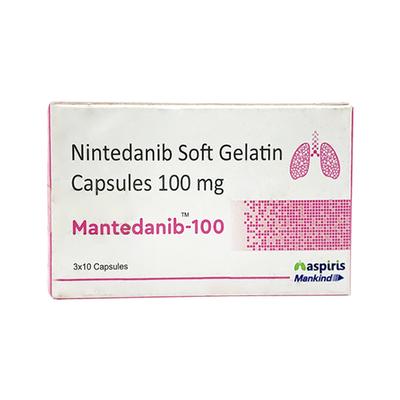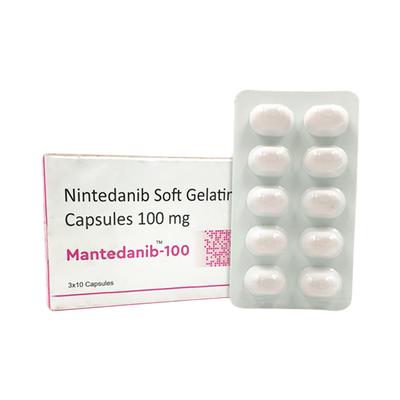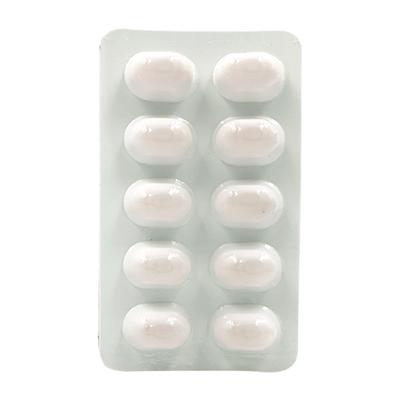

Netmeds First Membership
Quick Links
Introduction About MANTEDANIB 100 CAPSULE
MANTEDANIB 100 CAPSULE contains Nintedanib which belongs to the group of medicines called Kinase inhibitors. It is used to manage idiopathic pulmonary fibrosis (IPF), chronic fibrosing interstitial lung diseases (ILDs) with a progressive phenotype, slowing the rate of decline in pulmonary function in patients with systemic sclerosis-associated interstitial lung disease (SSc-ILD). It is used in combination with docetaxel in adult patients for the management of locally advanced metastatic or recurrent non-small cell lung cancer (NSCLC) of adenocarcinoma tumor histology after first line chemotherapy.
Idiopathic Pulmonary Fibrosis (IPF) is a chronic lung disorder in which the lungs become scarred and breathing becomes increasingly difficult. Symptoms include shortness of breath, persistent dry cough, tiredness, loss of appetite, weight loss, rounded and swollen fingertips (clubbed fingers).
Before taking MANTEDANIB 100 CAPSULE inform your doctor if you have liver, heart or bleeding problems, history of blood clots or had a recent surgery in stomach. MANTEDANIB 100 CAPSULE is not recommended for use in pregnant women unless advised by your doctor and it is not recommended for use in breastfeeding women as it may pass through breast milk. Before starting management with MANTEDANIB 100 CAPSULE, your doctor may want you to take several blood tests to understand your existing condition.
MANTEDANIB 100 CAPSULE should be used with caution in elderly patients (aged 65 years and above). The most common side effects of taking MANTEDANIB 100 CAPSULE are diarrhoea, nausea, vomiting, stomach pain, loss of appetite, headache, weight loss and high blood pressure. Consult your doctor if any of the symptom worsens.
Uses Of MANTEDANIB 100 CAPSULE
- Manage idiopathic pulmonary fibrosis (IPF)
- Manage chronic fibrosing interstitial lung diseases (ILDs) with a progressive phenotype
- To slow the rate of decline in pulmonary function in patients with systemic sclerosis-associated interstitial lung disease (SSc-ILD)
How MANTEDANIB 100 CAPSULE Works
MANTEDANIB 100 CAPSULE is a tyrosine kinase inhibitor (TKI) which works by blocking the enzymes in cells of the lungs called tyrosine kinases. Blocking these enzymes helps to decrease fibrous tissue formation in the lungs, thereby stops the symptoms of lung disease getting worse.
How to use MANTEDANIB 100 CAPSULE
Take MANTEDANIB 100 CAPSULE as advised by your physician. Swallow the medicine with a glass of water. Do not crush, chew, or open the medicine. Your doctor will decide the correct dose and duration for you based upon your age, body weight and disease condition. Do not stop taking MANTEDANIB 100 CAPSULE unless your doctor advises you to stop.
Side Effects Of MANTEDANIB 100 CAPSULE
Common
- diarrhoea
- nausea, vomiting
- stomach pain
- liver problems
- decreased appetite
- headache
- weight loss
- high blood pressure
Rare
Stop taking MANTEDANIB 100 CAPSULE and contact your doctor immediately if you experience any of the following side effects:
- severe liver problems symptoms such as yellowing of your skin or white part of your eyes (jaundice), dark or brown (tea colored) urine, pain on the upper right side of your stomach area (abdomen), bleeding or bruising more easily than normal, feeling tired, or loss of appetite
- severe diarrhoea, nausea and vomiting
- signs of heart attack such as chest pain or pressure, pain in arms, back, neck or jaw, or shortness of breath
- signs of stroke such as numbness or weakness on one side of your body, trouble talking, headache or dizziness
- signs of bleeding problem such as unusual bleeding, bruising, or wounds that do not heal
- signs of tear in stomach or intestinal wall (perforation) such as pain or swelling in stomach area
- signs of increased protein in urine (proteinuria) such as foamy urine, swelling of the hands, arms, legs, or feet or sudden weight gain
How To Manage Side Effects
Diarrhea
Drink lot of fluids, such as water to keep yourself hydrated. Try to avoid taking any medicine on your own to manage diarrhea and consult your doctor if the symptom gets worse.
Headache
Drink ample amount of water. Get adequate rest. Try to be relaxed and stress free. Do not strain your eyes by watching screen for long time. Apply pain relieving balm on your forehead if necessary. Consult your doctor if the symptom gets worse.
Loss Of Appetite
Eat when you are hungry. Eat smaller meals more often than usual. Snack only when you're hungry. Eat a nutritious snack which is rich in calories and protein, such as dried fruit and nuts. Consult your doctor if the symptom does not improve.
Nausea And Vomiting
Try to take MANTEDANIB 100 CAPSULE with or just after a meal or a snack. Stick to simple meals. Avoid eating oily, fried or spicy foods. Consult your doctor if the symptom gets worse.
Stomach Pain
Try to rest and relax. Eat and drink slowly or try to have smaller meals more frequently. Keep a heat pad on your stomach. If the stomach pain does not improve, consult your doctor.
Warning & Precautions
Pregnancy
Monitoring requiredMANTEDANIB 100 CAPSULE is not recommended for use in pregnant women unless considered clearly necessary. Consult your doctor before taking it.
Breastfeeding
ContraindicatedMANTEDANIB 100 CAPSULE is not recommended for use in breastfeeding women as it may pass through breast milk. Consult your doctor before taking it.
Liver
Use with CautionMANTEDANIB 100 CAPSULE should be taken with caution in patients with liver problems. Consult your doctor before taking it.
Allergy
ContraindicatedDo not take MANTEDANIB 100 CAPSULE if you are allergic to Nintedanib or any of the other ingredients of this medicine.
Heart Disease
Use with CautionMANTEDANIB 100 CAPSULE should be taken with caution in patients with heart problems. Consult your doctor before taking it.
Use In Pediatrics
Consult your doctorThere is no proper information regarding the use of this medicine in children. Consult child’s doctor for advice
Use In Geriatrics
Use with CautionMANTEDANIB 100 CAPSULE should be used with caution in elderly patients (aged 65 years and above). Consult your doctor before taking MANTEDANIB 100 CAPSULE
Others
Before taking MANTEDANIB 100 CAPSULE inform your doctor if you:
- have history of blood clots
- have bleeding problem or a family history of bleeding problem
- had recent surgery in stomach (abdominal) area
- are a smoker
Interactions
A. Drug - Drug interactions:
Before taking MANTEDANIB 100 CAPSULE inform your doctor if you are taking any of the following medicines:
- st. john’s wort (used to manage depression)
- laxatives such as bisacodyl, stool softeners such as lactulose (used to manage constipation)
- other medicines or dietary supplements (used to manage diarrhoea)
- blood thinners such as warfarin (used to manage or manage blood clots)
- aspirin (used to manage fever and pain)
Overdosage:
If you or anyone else accidentally take too much of MANTEDANIB 100 CAPSULE, consult your doctor immediately or visit the nearby hospital.
Synopsis
| Drug | : | Nintedanib |
| Pharmacological Category | : | Tyrosine Kinase Inhibitor |
| Therapeutic Indication | : | Idiopathic pulmonary fibrosis (IPF), Chronic fibrosing interstitial lung diseases (ILDs) with a progressive phenotype, slows the rate of decline in pulmonary function in patients with systemic sclerosis-associated interstitial lung disease (SSc-ILD) |
| Dosage Forms | : | Capsule |
More Information
- Keep MANTEDANIB 100 CAPSULE out of reach of children
- Store at room temperature
FAQs About MANTEDANIB 100 CAPSULE
Q: Can I take MANTEDANIB 100 CAPSULE during pregnancy?
A: MANTEDANIB 100 CAPSULE is not recommended for use in pregnant women unless clearly advised by your doctor. Consult your doctor before taking MANTEDANIB 100 CAPSULE if you are pregnant or planning to get pregnant.
Q: What to do If I forget to take a dose of MANTEDANIB 100 CAPSULE?
A: You should take MANTEDANIB 100 CAPSULE immediately when you remember. If it is time for your next dose skip the missed dose and follow your regular dose schedule. Do not double the dose to match up your missed dose.
Q: Can I stop taking MANTEDANIB 100 CAPSULE on my own?
A: Do not stop taking MANTEDANIB 100 CAPSULE unless your doctor advises you to stop. Remember that it works to slow the decline in lung function only for as long as you keep taking it. If you stop taking MANTEDANIB 100 CAPSULE suddenly it worsens the lung function and increases the risk of life-threatening complications.
Q: What are the common side effects of MANTEDANIB 100 CAPSULE?
A: The common side effects of taking MANTEDANIB 100 CAPSULE are diarrhoea, nausea, vomiting, stomach pain, loss of appetite, headache, weight loss, altered liver enzymes and high blood pressure. Consult your doctor if any of the side effect worsens.
Q: Is MANTEDANIB 100 CAPSULE safe to use in patients with liver disease?
A: MANTEDANIB 100 CAPSULE should be taken with caution in patients with liver problems. Your doctor may monitor your liver function before and during management with MANTEDANIB 100 CAPSULE to assess the risk of liver damage or any unusual effects. Consult your doctor before taking MANTEDANIB 100 CAPSULE.
References
1. Linda Skidmore. Selected New drugs. Mosby’s 2021 Nursing Drug Reference. 34th edition. 2021. Page- 1354.
2. Pilar Rivera-Ortega, Conal Hayton, John Blaikley, Colm Leonard, and Nazia Chaudhuri. Nintedanib in the management of idiopathic pulmonary fibrosis: clinical trial evidence and real-world experience. NIH: National Library of Medicine, National Center for Biotechnology Information. PMC Pubmed Central. September 2018 [Accessed on 30th July 2022] https://www.ncbi.nlm.nih.gov/pmc/articles/PMC6156214/
3. Ian Glaspole, Francesco Bonella, Elena Bargagli, Marilyn K. Glassberg, Fabian Caro, Wibke Stansen, Manuel Quaresma, Leticia Orsatti and Elisabeth Bendstrup. Efficacy and safety of nintedanib in patients with idiopathic pulmonary fibrosis who are elderly or have comorbidities. [Accessed on 30th July 2022] https://respiratory-research.biomedcentral.com/articles/10.1186/s12931-021-01695-y
4. Boehringer Ingelheim Pharmaceuticals, Inc. U.S. Food & Drug Administration. [Revised in March 2020] [Accessed on 30th July 2022] https://www.accessdata.fda.gov/drugsatfda_docs/label/2020/205832s013lbl.pdf
5. Boehringer Ingelheim Pharmaceuticals, Inc. U.S. Food & Drug Administration. [Revised in January 2022] [Accessed on 30th July 2022] https://docs.boehringer-ingelheim.com/Prescribing%20Information/PIs/Ofev/ofev.pdf
6. Central Drugs Standard Control Organization (CDSCO). Nintedanib. [Accessed on 30th July 2022] https://cdscoonline.gov.in/CDSCO/Drugs
Useful Diagnostic Tests
- Liver function tests
- Pulmonary function tests









